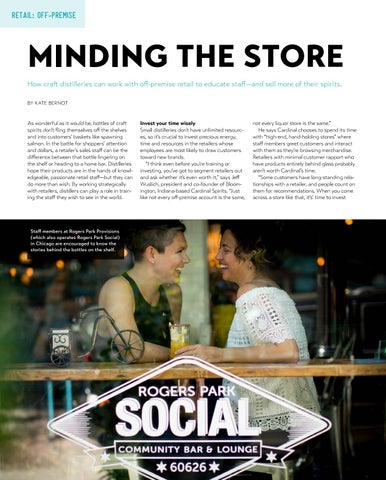Retail: Off-Premise
MINDING THE STORE How craft distilleries can work with off-premise retail to educate staff—and sell more of their spirits. BY KATE BERNOT
As wonderful as it would be, bottles of craft spirits don’t fling themselves off the shelves and into customers’ baskets like spawning salmon. In the battle for shoppers’ attention and dollars, a retailer’s sales staff can be the difference between that bottle lingering on the shelf or heading to a home bar. Distilleries hope their products are in the hands of knowledgeable, passionate retail staff—but they can do more than wish. By working strategically with retailers, distillers can play a role in training the staff they wish to see in the world.
Invest your time wisely Small distilleries don’t have unlimited resources, so it’s crucial to invest precious energy, time and resources in the retailers whose employees are most likely to draw customers toward new brands. “I think even before you’re training or investing, you’ve got to segment retailers out and ask whether it’s even worth it,” says Jeff Wuslich, president and co-founder of Bloomington, Indiana-based Cardinal Spirits. “Just like not every off-premise account is the same,
not every liquor store is the same.” He says Cardinal chooses to spend its time with “high-end, hand-holding stores” where staff members greet customers and interact with them as they’re browsing merchandise. Retailers with minimal customer rapport who have products entirely behind glass probably aren’t worth Cardinal’s time. “Some customers have long-standing relationships with a retailer, and people count on them for recommendations. When you come across a store like that, it’s’ time to invest
Staff members at Rogers Park Provisions (which also operates Rogers Park Social) in Chicago are encouraged to know the stories behind the bottles on the shelf.
64 |
DEC EM BER 201 9
C R AF T S PI R I T S MAG .CO M
